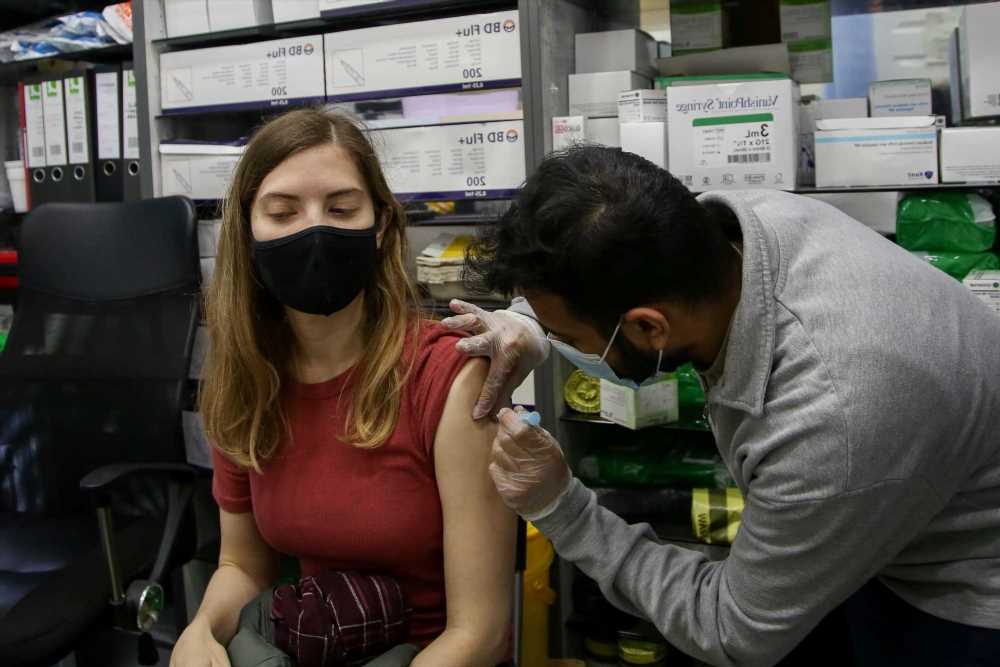FOUR out of five patients in hospital with Omicron have not had a booster jab to protect against Covid.
A total of 608 out of the 815 people receiving urgent care across the country have not had that all-important third shot, while a quarter are completely unvaccinated.

The UK Health Security Agency (UKHSA) confirmed the data after a study revealed booster jabs give 88 per cent protection against being hospitalised with the new variant.
The encouraging new findings came as Brits were urged to get their extra dose to beat the variant and return to life as normal.
Health and Social Care Secretary Sajid Javid said: "This is more promising data which reinforces just how important vaccines are. They save lives and prevent serious illness.
"This analysis shows you are up to eight times more likely to end up in hospital as a result of Covid-19 if you are unvaccinated.
"It is never too late to come forward for your first dose and it’s vital that everyone comes forward to get boosted now as we head into the new year."
A string of hugely positive studies have found Omicron IS milder than other strains, with the first official UK report revealing the risk of hospitalisation is 50 to 70 per cent lower than with Delta.
Covid booster jabs protect against Omicron and offer the best chance to get through the pandemic, health officials have repeatedly said.
The Sun's Jabs Army campaign is helping get the vital extra vaccines in Brits' arms to ward off the need for any new restrictions.
Most read in Health
VIRAL LOAD PM NOT expected to impose Covid rules next week as jabs rollout slows Omicron
UK Omicron cases near 250,000 on New Year's Eve- as daily Covid deaths hit 203
More than 2m had Covid last week- but boosters working to stop hospitalisations
New Covid at-home pills that slash risk of hospitalisation set for NHS rollout
UKHSA and the Cambridge University MRC Biostatistics unit found vaccines do work to prevent serious illness from Omicron.
One dose of any vaccine was associated with a 35 per cent reduced risk of hospitalisation among symptomatic cases with the Omicron variant.
Two doses offered a 67 per cent reduction up to 24 weeks after the second dose, and there was a 51 per cent reduced risk 25 or more weeks after the second dose.
Vaccine effectiveness against hospitalisation was estimated as 52 per cent after one dose, 72 per cent two to 24 weeks after dose two, 52 per cent 25-plus weeks after dose 2 and 88 per cent two weeks after a booster dose.
Susan Hopkins, Chief Medical Adviser at UKHSA, said: "The latest set of analysis is in keeping with the encouraging signs we have already seen.
"However, it remains too early to draw any definitive conclusions on hospital severity, and the increased transmissibility of Omicron and the rising cases in the over 60s population in England means it remains highly likely that there will be significant pressure on the NHS in coming weeks.
"The data once again shows that coming forward for your jab, particularly your third dose, is the best way of protecting yourself and others against infection and severe disease."
🔵 Follow our Covid live blog for all the latest news & stories
Last month, experts concluded the variant – which threw Britain's path out of the pandemic off course – does spark a less serious illness than Delta in most people.
UKHSA also confirmed that two vaccine doses aren't enough to give strong protection, but a booster significantly reduces the chance of both symptomatic infection and hospitalisation.
Their findings echo those of countless health officials who have repeatedly said Covid booster jabs protect against Omicron and offer the best chance to get through the pandemic.
It comes as Covid hospital admissions in England rose by 50 per cent in the week before Christmas – but a THIRD went in for other health problems.
Around 33 per cent of all Covid positive people in hospital were found to have the virus as a secondary issue, fresh data showed.
It means that while cases and admissions have risen, a large chunk of them were not serious enough to end up in hospital but ended up there for other reasons.
PROMISING SIGNS
New data released yesterday from NHS England showed on December 18 there were 709 new Covid patients in hospitals, and by December 26 the number had risen to 1,338.
But the figures also backs up expert studies showing Omicron is milder than other Covid variants, as only a small proportion have so far needed critical care.
Boris Johnson pleaded in his New Year Eve address for Brits to "get boosted now".
He said: "I want to speak directly to all those who have yet to get fully vaccinated.
"The people who think the disease can’t hurt them, look at the people going into hospital now. That could be you.
"Look at the intensive care units and the miserable, needless suffering of those who did not get their booster. That could be you.
"So, make it your New Year’s resolution. Find a walk-in centre or make an online appointment.
"Get that jab and do something that will make 2022 a happy New Year for us all."
Experts agree that vaccines offer the best way out of the pandemic – but everyone needs to get on board – especially as daily infections continue to rise.
The UK recorded a record 189,846 fresh cases on December 31, as well as 203 deaths.
The data was meant the Prime Minister is facing calls to tighten restrictions in England, following in the footsteps of Scotland, Wales and Northern Ireland.
Boris Johnson has so far resisted, but gloomy modelling suggests the UK could see a staggering 6,000 deaths a day if we don't act now.
The PM is expected to update the nation on Covid next week.
Source: Read Full Article










